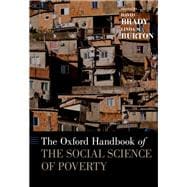Despite remarkable economic advances in many societies during the latter half of the twentieth century, poverty remains a global issue of enduring concern. Poverty is present in some form in every society in the world, and has serious implications for everything from health and well-being to identity and behavior. Nevertheless, the study of poverty has remained disconnected across disciplines.
The Oxford Handbook of the Social Science of Poverty builds a common scholarly ground in the study of poverty by bringing together an international, inter-disciplinary group of scholars to provide their perspectives on the issue. Contributors engage in discussions about the leading theories and conceptual debates regarding poverty, the most salient topics in poverty research, and the far-reaching consequences of poverty on the individual and societal level. The volume incorporates many methodological perspectives, including survey research, ethnography, and mixed methods approaches, while the chapters extend beyond the United States to provide a truly global portrait of poverty.
A thorough examination of contemporary poverty, this Handbook is a valuable tool for non-profit practitioners, policy makers, social workers, and students and scholars in the fields of public policy, sociology, political science, international development, anthropology, and economics.








